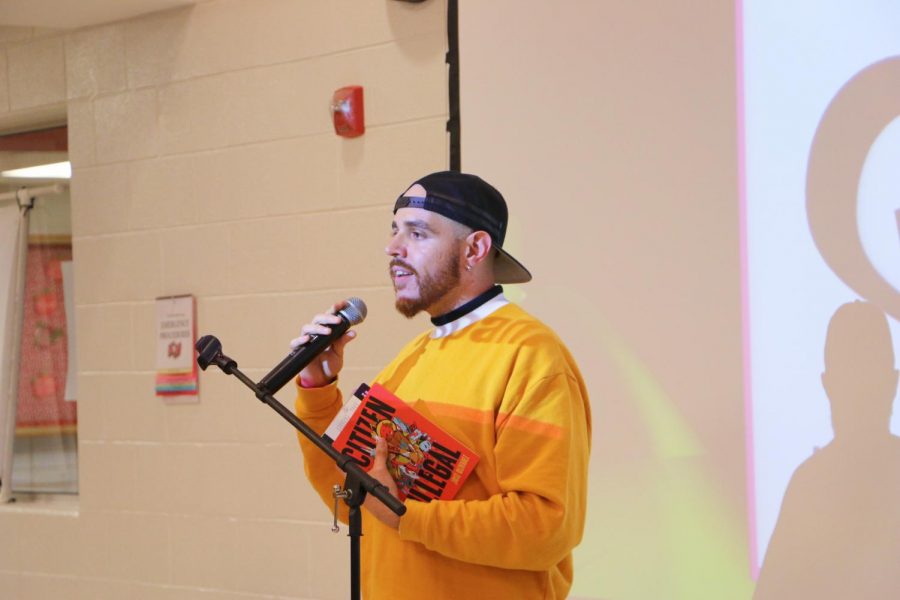Q and A with Poet José Olivarez
Olivarez recites one of his poems from his book. His poetry incorporates a mix of Spanish and English.
Sep 19, 2018
Poet, José Olivarez, visited Niles West last Friday in the South Lobby for a poetry reading for his new book, “Citizen Illegal”. The highly anticipated event had a great turn out consisting of staff and students alike. Luckily, José Olivarez was able to insightfully answer questions based upon his experiences thus far as a poet, along with how is culture has influenced his poems.
Q: When did you first become interested in poetry?
A: So for me, when I saw that poetry was something I can be a part of, that there was room for me at the table, that’s when I was like ‘that’s something I’m hungry for, that’s something that I want to do.’ High School is when I started getting into poetry.
Q: What do you love most about poetry?
A: The thing I love about poetry and think is so valuable right now is that poems can be very small and they can be very powerful. So I love that about a poem. Most poems take about a couple minutes at max to read. I love that poetry gets the chance to transform something so that you can take the facts of the story and rewrite them and make them something else. I love the way it uses imagination.
Q: What advice would you give to a young poet?
A: My advice is to read as much as you can. Writing is important, but the way I’ve really grown is just by reading everything. I read as many different poets and read as many different styles, as well as books. If I don’t like something then that’s okay, but I can start to think about why I don’t like a particular style.
Q: What’s your take on Spanish? Can you also write poetry in Spanish or just in English?
A: Spanish was my first language, and it’s still the language that I use to talk to my mom so it’s still very personal and important to me. For a long time, I felt a lot of shame with whether I’m bad at English or whether I’m bad at Spanish. I can write poetry in Spanish, but I think for me, sometimes it’s hard because I grew up comfortable with English. That’s the much more natural language for me. Recently I’ve realized at some point, my mind switched and I used to translate everything from Spanish to English, but now I translate everything from English to Spanish. It makes me feel like I’m living a different life.
Q: What’s the biggest obstacle that you’ve run into as a well-known poet?
A: One big challenge that I faced was coming out of college, I applied to graduate school in creative writing and I got rejected in every program that I applied to. In that moment I doubted whether if I was talented enough to become a poet. But I couldn’t stop. Even if I wasn’t successful, I think I would always write. I love the challenge of writing, I love playing with language and being silly. I love telling stories.
Q: How long does it take you to write a poem?
A: A poem can vary, some poems are very fast, while others are gradual. One poem from my book is from 2007. I wrote it in 2007 and then I revised it in 2017 and 2018. The first poem in the book, Mexican American Disambiguation, took about three or four days before I was like this really looks good. Mexican Heaven took a few weeks. It was one long poem until I cut it up in parts, but that took a long time too.
Q: Besides the people in your high school, were there any poets that you admired growing up?
A: Yeah. When I was growing up the poets we looked up to were Saul Williams and Jessica Care More. Those were the poets that I had access to who was on Def Poetry. I would go read any of their works and I slowly start to read more poetry from different poets based off their shoutouts.
Q: What was your experience like at Harvard?
A: For me going to Harvard was a way different experience and there were some really great positives to that and also some things that I wasn’t prepared for. It was a bit of a culture shock. But once I got grounded there and found my friends, I got my start. I got to travel to Brazil and that part was really cool. I also had access to an incredible library where I can learn about anything that I wanted. All those things were very cool, I just had to figure out how to find my community before I can take advantage of that.
Q: What’s your favorite thing about doing poetry readings?
A: My favorite thing about doing poetry readings is getting the chance to talk to people who are moved by the verses and just getting the chance to talk to the readers.




